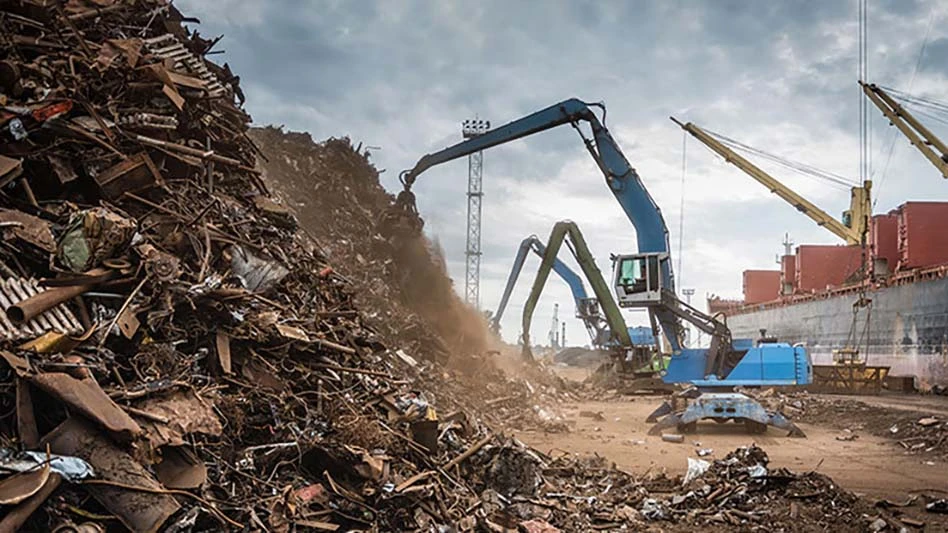
ako-photography | stock.adobe.com
Brussels-based EuRIC, which represents European recycling companies, is warning the European Commission against imposing restrictions on scrap exports, saying exports have kept recycling businesses alive as they serve to counterbalance “extremely low” demand for recyclables within the European Union.
The warning follows a letter dated Dec. 19, 2024, that Eurofer and European Aluminium, also based in Brussels, sent to the European Commission calling for restrictions on exporting ferrous and nonferrous scrap from Europe. In the letter, the associations say, “Enhancing aluminum and steel recycling is crucial not only for their value chain’s decarbonization but also for achieving the EU’s circular economy objectives. Recycling can save up to 95 percent and 80 percent of the energy required for primary aluminum and steel production, respectively. Aluminum and ferrous scrap are strategic secondary raw materials for the EU economy and instrumentals for EU goals. We believe that the importance of their roles could be highlighted and utilized in the upcoming Circular Economy Act as well.”
The associations write, “Scrap exports are, in essence, exports of energy and valuable raw materials in a continent starved for both" and request that the European Commission consider adopting measures to limit the export of scrap to third countries that have imposed export restrictions on their critical raw materials, make use of the recently adopted Foreign Subsidies Regulation, leverage existing EU legislation to its full extent by building on the Waste Shipment Regulation and the Critical Raw Materials Act “to enforce a stricter regime for scrap exports and better monitor their flows” and revise the End-of-life Vehicles Directive to reduce illegal exports of end-of-life vehicles and increase scrap supply.
EuRIC says any calls by European steel and aluminum producers to restrict scrap exports “are completely unjustifiable and unacceptable, especially when the supply of recycled scrap has never been the reason behind any decreased activity of EU mills.”
EuRIC says closing EU borders for scrap exports will have detrimental consequences to the environment, the economy and EU’s competitiveness. The prolonged decline of European steel and aluminum production is concerning for recyclers as it threatens Europe’s competitiveness and the "green" and digital transitions.
However, the EUROFER and European Aluminium letter states that “the volume of scrap that could and should be recycled in Europe is drastically diminishing due to increasing scrap exports. Ferrous scrap exports have more than doubled over the last few years, rising from 9.14 million [metric tons] in 2015 to 18.92 million [metric tons] in 2023, reaching its maximum of 19.43 million [metric tons] in 2021. European aluminum scrap exports have reached roughly 1 million [metric tons] of annual exports over the last years, peaking at 1.2 million [metric tons] in 2023. A new record is expected to be set by the end of 2024, with aluminum scrap exports expected to exceed 1.3 million [metric tons.]”
EuRIC says protectionism and protectionist measures are not effective for addressing trade challenges and work against the European recycling industry, which is the EU’s circularity backbone.
“We urge EU policymakers to preserve open trade and carefully consider the EU recycling industry’s contributions to the EU economy and sustainability and to only endorse measures that encourage them to keep innovating and generating resources, instead of hampering them and threatening their very existence,” EuRIC adds.
Latest from Recycling Today
- BMW Group, Encory launch 'direct recycling’ of batteries
- Loom Carbon, RTI International partner to scale textile recycling technology
- Goodwill Industries of West Michigan, American Glass Mosaics partner to divert glass from landfill
- CARI forms federal advocacy partnership
- Monthly packaging papers shipments down in November
- STEEL Act aims to enhance trade enforcement to prevent dumping of steel in the US
- San Francisco schools introduce compostable lunch trays
- Aduro graduates from Shell GameChanger program





